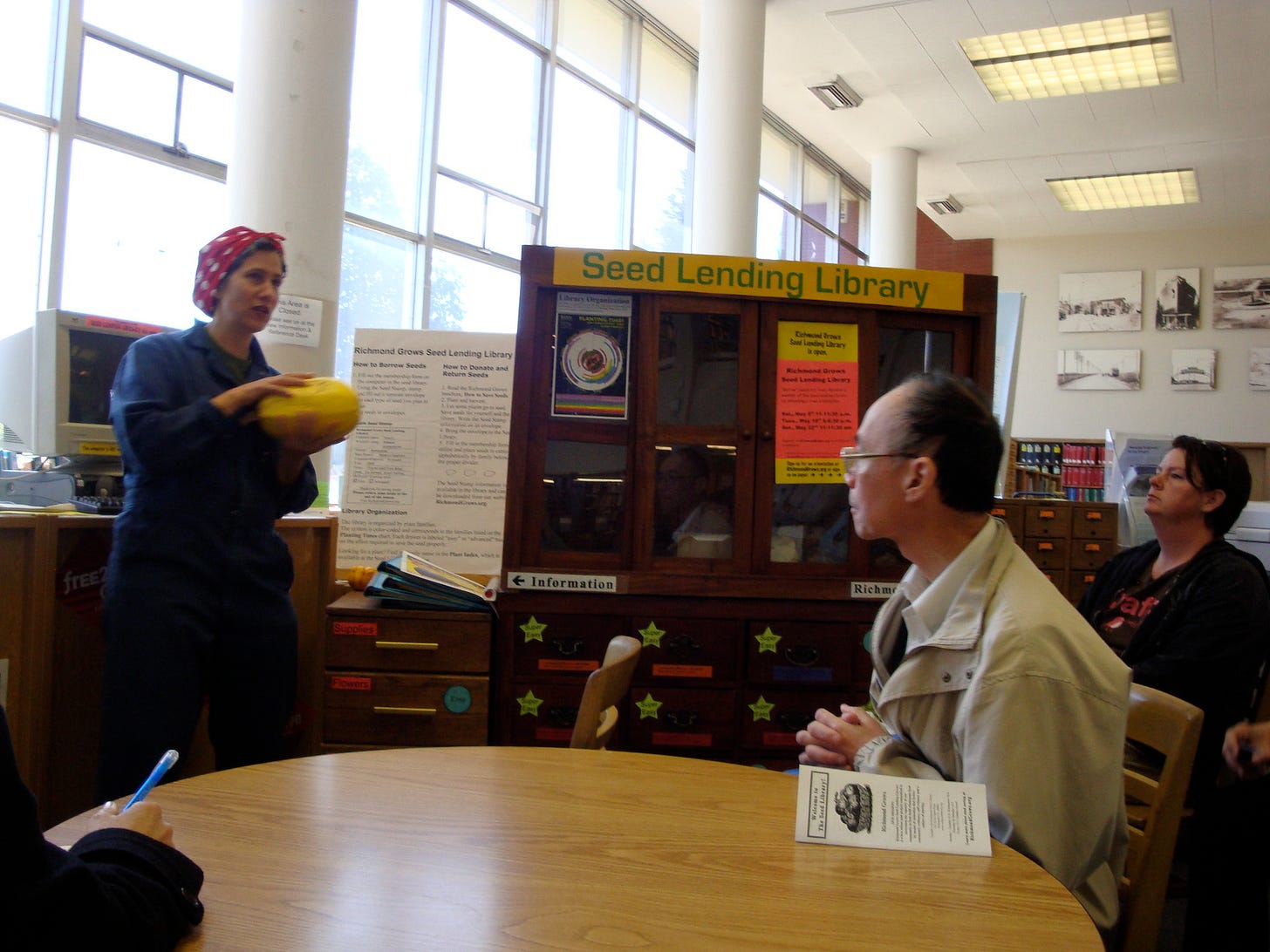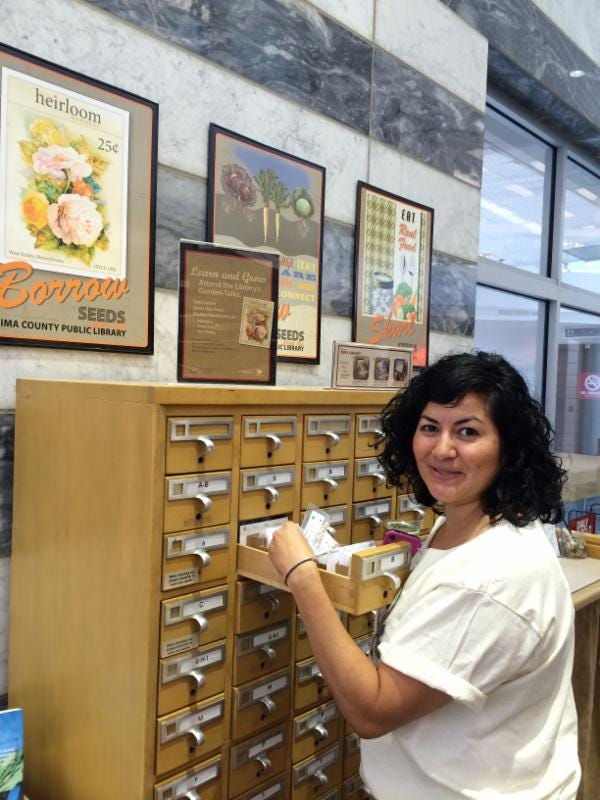By Rebecca Newburn
Co-Founder of Richmond Grows Seed Lending Library, Founder of the Seed Library Network
Captivated by the wealth of inspiring ideas in my permaculture design class, I pondered, “I can’t do it all. What is mine to do?” The word “Seeds!” reverberated through every cell in my body, and I felt a strange sense of clarity and confusion. I knew almost nothing about seeds, yet the answer made sense.
Local seeds are the foundation of community and culture and our ability to survive and thrive.
With this realization, I made a decision: I wanted to establish a seed library, and I wanted to make it a replicable model so any community that doesn’t already steward their seeds can do so. Luckily, my permaculture teacher, Christopher Shein, happens to be one of the founders of the Bay Area Interchange Seed Library (BASIL) at the Berkeley Ecology Center in Berkeley, California, which is the oldest seed library in the modern sense of the term.
At the time, I was part of the Richmond Rivets, our local transition town group. While we weren't quite ready to take on a project, an undeniable urge pushed me to move forward with the seed library idea. In January 2010, I reached out to a librarian at the Richmond Public Library, hoping for support. A couple of months later, the library agreed to provide space.
Coincidentally, as I talked about organizing the seed library in Richmond, key figures from BASIL were converging before they dispersed just like the seeds they had stewarded for years —Terri Compost, who had maintained BASIL was moving to Washington, Anders Vidstrand was moving East, and Sascha DuBrul who had suggested creating the seed library relocated to New York before seeing BASIL open in 2000 was back for a month. (A side note, Sascha planted the idea for a seed library in his public library in Gardiner, New York, where he inspired librarian Ken “K” Greene, who went on to found the Hudson Valley Seed Library.) Despite my lack of expertise in seed saving, I felt compelled to offer my assistance in helping to organize BASIL with full disclosure that I wanted to use these conversations to help me create one in Richmond and beyond.
As a middle school science teacher, I felt that the structure should embed education. Hence, we decided to organize the seeds by plant family. It’s great to be with one’s relatives, too! A month later, BASIL was reorganized, and they all dispersed except for Christopher, and I was ready to turn my attention to Richmond.
With the help of friends, including Catalin Kaser and Trish Clifford, we launched the Richmond Grows Seed Lending Library on May 1st, 2010 with our first in-person orientation. We were the 6th seed library to open (preceding us were BASIL, Hudson Valley Seed Library, SPROUT Seed Library, Community Seed Exchange, and Portland Seed Library). Our efforts didn't go unnoticed, and in June, we received recognition from the East Bay Express "Best of the Bay - Seed Library Award.” Someone must have written that in because, at that time, there were only 2 seed libraries in the East Bay of San Francisco. There are now 40! The press release that the interim director wrote generated interest, and the news of seed libraries went fungal!

Through word-of-mouth and media coverage, our initiative gained traction, inspiring others to consider similar projects in their communities. The Community Seed Exchange in Sebastopol, CA, opened a few months before we did, and we decided to co-host a California Seed Library Summit. About a dozen seed libraries opened that first year and 25 of us gathered in Sebastopol to discuss seed library best practices. It was decided that we should meet again in 6 months, which ended up coinciding with the first National Heirloom Expo in Santa Rosa, California, in September 2011. It was also around this time that I started to track the seed libraries that were emerging.
The growing interest motivated me to figure out how to make it a replicable model, so I developed the “Create a Library” resources at RichmondGrowsSeeds.org. One group of my 6th-grade middle school science students wanted to create a seed library in our school for their Mission Sustainable project. They came across Richmond Grows’ website, not knowing that I created it, and I decided to not tell them. They navigated successfully through the process of opening the Hall Middle School Seed Lending Library without support, which helped verify that the content would be readily accessible.
Around that time, Bill McDorman introduced me to Justine Hernandez of the Pima County Public Library. She expressed interest in establishing a seed library, and we discussed her upcoming presentation to the library director. A few weeks later, she reported how nervous she was because during her presentation, the director was writing copious notes, and she anticipated a slew of counterarguments but instead was pleasantly overwhelmed when the director wanted to extend to multiple branches. They now host 19 seed libraries with interlibrary seed loans through their digital catalog throughout their 27 branches and have a local seed return rate of 35-45%!

In 2012, Bill McDorman and Belle Starr, who created the Seed School program (which I was grateful to have attended the first one in their home in 2010) invited me to be part of a Seed Library School at Native Seed/SEARCH. That accelerated my path to document the process of how to open and maintain a seed library. The newly opened seed libraries were generous in sharing ideas and inspiration and I was able to incorporate them into my course, which was uploaded to Dropbox.
As the number of libraries continued to grow, I found immense joy in connecting with most of them during their initial years. Additionally, some places started to sprout a community of seed libraries, such as those around Grimsby Grows and Toronto Seed Library in 2013. Author Cindy Conner, whose daughter Betsy Trice had opened a seed library, highlighted the work that was happening in communities in her book Seed Libraries: And Other Means of Keeping Seeds in the Hands of the People. Right before her book went to the publisher in June 2014, I received an unexpected email from Mechanicsburg, Pennsylvania, that shook me to the core. They informed me that they had received a letter from the Pennsylvania Department of Agriculture notifying them that their seed library was in violation of the state seed law. This prompted me to email the other Pennsylvania seed libraries on the list to assess if others had faced similar challenges. While no other libraries had been approached, this incident galvanized me to assemble a team to confront the potential obstacles to local seed saving and sharing.
Spoiler Alert 📢! We were able to amend the Recommended Universal State Seed Law (RUSSL) and get seed laws on the books in key states to protect local seed. More on this in our next post, Part 2: National Seed Sharing Campaign.
Share Your Seed Library Materials and Tips -
Envelopes, Labels, and Membership Forms Wanted!
We are excited to announce that the Resource Collection Team is currently gathering seed envelopes, packaging examples, and membership forms from the global community of seed libraries. We would like to extend the call for resources to you! If your seed library has special seed envelopes or packaging and wants to share seed packing tips, protocols, and membership forms with the community, please complete the form(s) below.
We’d love to create an open source digital membership and borrowing form. Add your thoughts to the second form. What would YOUR ideal digital membership and borrowing form include? We’d 💚 your input!
Seed Envelopes and Labels: Airtable form
Membership and Borrowing forms: Airtable form
We ask that you submit images as a JPEG, PDF, or Word. We look forward to seeing your envelopes and packages!
Here are some wonderful examples from the community we have already received:
Stay rooted with us on social media for all the latest sprouts and seed library tips! 🌱🌿
🌏 Global Seed Library Census 📌
Are you part of a seed library? Have you folks filled in the Global Seed Library Census? Get your library on the map and also tell us what needs you have and what resources you’d like to share with the community. Know of a seed library not listed? Send them the link, http://bit.ly/seedcensus. Available in 16 languages!




We love sharing all the different seeds from local gardeners at our locations. When I think back to my Oma, she was all about sharing. https://www.freeplantngardenstands.org
This was such a sweet read! I didn't a lot of this history :)